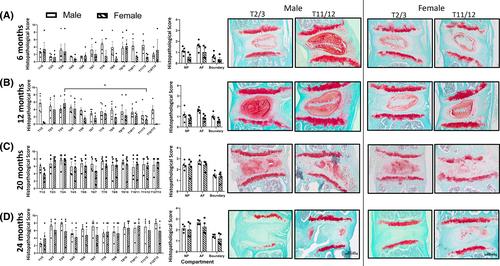Intervertebral disc (IVD) degeneration is a major contributor to back pain and disability. The cause of IVD degeneration is multifactorial, with no disease-modifying treatments. Mouse models are commonly used to study IVD degeneration; however, the effects of anatomical location, strain, and sex on the progression of age-associated degeneration are poorly understood.
A longitudinal study was conducted to characterize age-, anatomical-, and sex-specific differences in IVD degeneration in two commonly used strains of mice, C57BL/6 and CD-1. Histopathological evaluation of the cervical, thoracic, lumbar, and caudal regions of mice at 6, 12, 20, and 24 months of age was conducted by two blinded observers at each IVD for the nucleus pulposus (NP), annulus fibrosus (AF), and the NP/AF boundary compartments, enabling analysis of scores by tissue compartment, summed scores for each IVD, or averaged scores for each anatomical region.
C57BL/6 mice displayed mild IVD degeneration until 24 months of age; at this point, the lumbar spine demonstrated the most degeneration compared to other regions. Degeneration was detected earlier in the CD-1 mice (20 months of age) in both the thoracic and lumbar spine. In CD-1 mice, moderate to severe degeneration was noted in the cervical spine at all time points assessed. In both strains, age-associated IVD degeneration in the thoracic and lumbar spine was associated with increased histopathological scores in all IVD compartments. In both strains, minimal degeneration was detected in caudal IVDs out to 24 months of age. Both C57BL/6 and CD-1 mice displayed sex-specific differences in the presentation and progression of age-associated IVD degeneration.
These results showed that the progression and severity of age-associated degeneration in mouse models is associated with marked differences based on anatomical region, sex, and strain. This information provides a fundamental baseline characterization for users of mouse models to enable effective and appropriate experimental design, interpretation, and comparison between studies.



